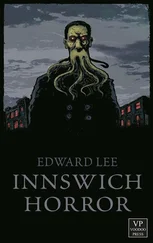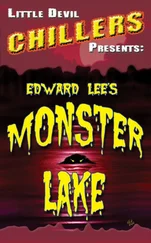Several ova lay dead on the tank's floor. But the bristleworms they'd attacked seemed to throb, and were bloated from within. The worms were still alive but barely moving. Then one of them-
"Unbelievable!" Loren exclaimed.
The bristleworm began to disgorge a slew of much tinier worms.
Within a few minutes, the other bristleworms in the tank did the same, until the water was tinted pink with so many tiny worms.
Nora was flabbergasted.
"Like the Tessae worms in central Africa," Loren murmured. "And the-"
"And some of the Trichinella family. Our little pink parasite has the ability to attack a different annelid species with free-ranging ovum and force it to bear its young."
But the revelations didn't stop there. Nora and Loren squinted harder as the minuscule newborn worms began to slither en masse up the face of the tank. Eventually they were twitching out over the side.
I'm starting to get a little freaked," Loren said in a low drone. "They're coming out of the friggin' water, Nora."
"Just wait a minute. It won't take them long to die. They have to suffocate…"
They waited for another minute, then another.
"Jesus…"
Ten minutes later, the newborn worms hadn't died. They were all out of the tank and moving across the table.
"Well, how many impossibilities can we take for one day?"
"A marine worm with air-breathing capabilities," Nora said very slowly. "Every worm in the world that can do this has been exhaustively catalogued." Her face felt hot in aggravation. "There's no way-no fucking way in the world-that an annelid like this could remain uncatalogued."
"No fucking way in the world, huh?" Loren directed his displeasure in the obvious direction of the mass of worms. They were moving toward them on the table. And the bean-sized ova that had crawled up the wall, too, had changed direction now, once Loren and Nora had come over to the table.
"They're detecting our presence," Loren said.
"Fibrotic sensory pores," Nora guessed. "They're reading the carbon dioxide we exhale-which triggers their instinct ganglia that a potential host is near."
"Uh-huh, and I -don't want to find out what happens if one of those little things gets on me."
Nora sloughed that one off. "If one of them got into your bloodstream, your immune-system. would kill it."
"Yeah? I'm not going to wait for my immune system to do the job." Loren picked up a can of mosquito spray. Nora was about to object-they were specimensbut…
Not a bad idea, she recanted. The chlordane and diethyl-meta groups in the repellent would kill the worms just as it had killed the ova in the shower stall. The just-hatched worms on the table were so tiny yet so abundant that they looked more like spilled pink lemonade-lemonade that moved of its own instincts.
Loren smirked as he sprayed down the table and wall. He sprayed more directly into the tanks.
In a few moments, the ova on the wall dropped off dead, and the worms shriveled and died.
"So much for them," Loren said.
"Loren the Worm Killer. But we're going to have to preserve some of these and take them to Florida Natural Resources. I guarantee you, they don't know about this. Chitin-penetrating parasites like these? That reproduce this actively and can attack multiple hosts? If these things broke out, they could decimate the gulf's crustacean harvest."
"Well, at least only one lobster was infected," Loren noted, calmed down now. "This could be a fluke infection, you know."
Could be, Nora thought. Maybe it was a lucky hit on the part of the worm. But if they wiped out these bristleworms that easily, it could wipe out an entire food chain.
Loren had used the lab's forceps to place one of the dead shower ovum under his microscope. "These are the same, Nora. Just a lot bigger."
Nora had figured as much. The hunch wouldn't let go. She took Loren's slide and placed it under her own dual-lensed scope, to properly compare the dead ova against the smaller ones mixed with the worms from the lobster. When she switched on both fields…
"Oh my God."
"What"
"See for yourself," Nora said.
Loren looked in the comparator scope. He only looked for a second before he lifted his eyes away.
"Oh my God is an understatement," he said.
Nora had seen it first, and wanted clarification.
The tiny worms from the lobster weren't so tiny anymore. They filled the entire space of the slide's viewing perimeter now, and the ova in their proximity could now easily be detailed.
Loren stood erect, dumbfounded. Confusion made his eyes looked glazed. "This can't be."
"Tell me about it," Nora said. "Those things are ten times bigger than they were twenty minutes ago."
Loren nudged her back to the microscope. "Look back in there," he said, a little jittery now. "Keep your eye on them fora full minute, then tell me your observations."
Nora did so.
She knew what he was driving at in significantly less than a minute.
She could actually see the worms and ova growing before her eyes.
(I)
"What do you make of it, Sergeant?" the colonel asked, having made a rare appearance from his makeshift field office. The sergeant had logged the observed activity at the old head shack, believing it to be "atypical."
We must be getting ready to leave, the sergeant pondered. Why's he so interested in a bunch of civilians all of a sudden?
The corporal was manning the monitor controls, zooming the military's very best lenses, but he seemed more fixed on the slender woman with frizzed hair. Have to get that kid's mind out of the garbage, the sergeant thought.
"Look at that," the colonel said. The image onscreen lurched forward from the zoom: a closer shot of the slender woman in the dark one-piece swimsuit. She was leaning over a computer now, typing something. The colonel added, "I don't like it. It looks like she's recording data. Data on what?"
The sergeant stepped closer. "I'm not sure, sir. As I noted in my log, the civilian activity in that building seemed harmless. But I could be mistaken."
"It looks like they're keeping specimens of some kind in there."
"That wasn't the case earlier, sir."
The colonel faced the sergeant directly. "In your estimation, is there any way the civilians know we're here?"
"In my estimation, sir-no."
"What about you, Corporal?"
"No signs of detection, sir."
"The only civilian who ever saw me was in the second arrival group… and he's dead. That's verified and recorded. The fourth group's craft has been disabled. In fact, every civilian to come on the island is now infected, this third group being the only exception. What they're doing seems routine and unalarmed. I think it's some kind of nature excursion-the blond woman appears to be a photographer."
The colonel thought on it, then watched the screen some more. "You're always right, Sergeant, and I'm not disputing your assessment. But I still need to know what they're up to. I need you two men to make another trip outside and guarantee me that what they're doing won't compromise our tests."
"Yes, sir," the sergeant said.
"Good, then do it. Do it tonight."
The colonel's boots snapped as he left the room.
The corporal looked up when the door closed. "I wonder what's up his ass."
"He's bucking for general, and he'll probably get it if this mission yields positive results. That guy's been do ing these field jaunts for years-it racks up promotion points. He's not going to let anything screw this up."
The corporal rolled back in the chair, put his feet up on the old desk that was once used by missile-control officers. "The hybrids are duplicating better than we ever expected. We already know that they don't hesitate to attack human hosts. The worms and the ova alike have already proved that they can live in multiple environments. Why can't we just go home now?"
Читать дальше












